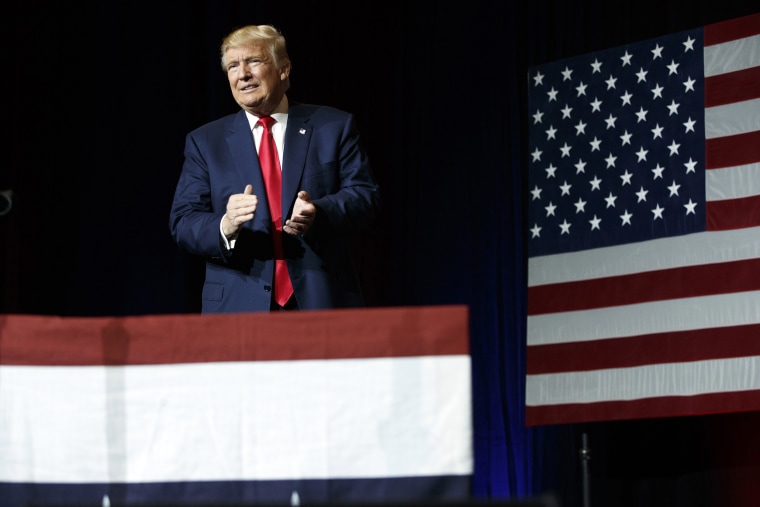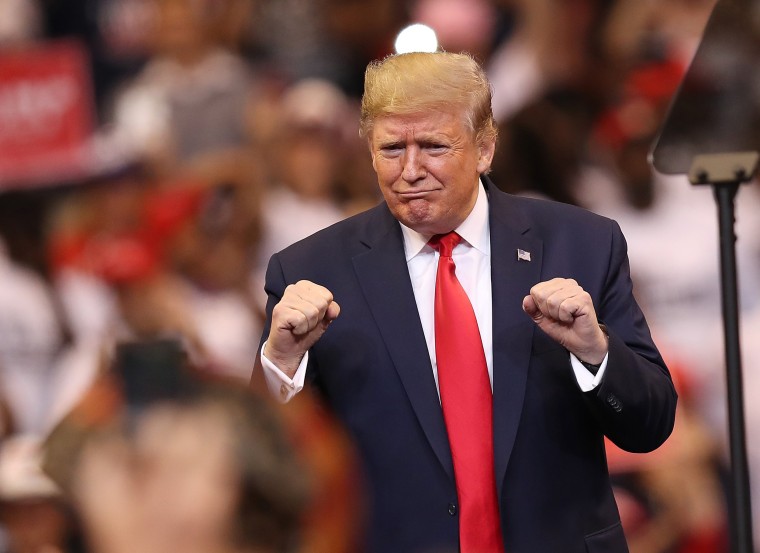MIAMI — The word “socialist” gets bandied about a lot by Florida Republicans when they describe Democrats to the state's growing number of Latino voters. But Democrats are countering with another loaded word of their own — "caudillo," equating President Donald Trump to a Latin American authoritarian ruler, or strongman.
Christian Ulvert, a Democratic strategist, said when he talks to voters in South Florida, he doesn’t name Trump. He describes a leader who “divides people, attacks the press, lies to create political division and threatens to jail political opponents.”
Then it hits the voters, Ulvert said. “We’re not talking about a foreign leader. We’re talking about our president."
"Caudillo" has been used for generations to describe many of Latin America's authoritarian leaders, whether from the right — like Chile’s Augusto Pinochet and the Dominican Republic’s Rafael Trujillo — or from the left, like Venezuela’s Hugo Chávez.
Florida is the state where Trump finds his greatest Latino support. Unlike the Latino electorate as a whole — where people of Mexican descent are the majority of eligible voters — Florida has a bigger mix of Hispanic voters. Cubans and Puerto Ricans each make up about a third of the state’s Latino vote. In 2016, Florida Cubans were twice as likely as non-Cuban Latinos to back Trump.
But add to that a growing mix of Venezuelans, Nicaraguans, Chileans, Colombians and other populations who are tracking not just domestic issues but U.S. policies regarding their home countries.
For example, while the share of Venezuelans who make up Latino eligible voters is only 0.5 percent nationally (154,000), it's 2.4 percent (72,000) in Florida, according to Pew Research Center, which examined 2017 data. In a battleground state like Florida, these voters matter to both parties.
A White House Chavista?
Ulvert said his Venezuelan husband constantly tells him “watching Donald Trump is reliving the rise of Chávez,” the populist and polarizing leader of Venezuela, considered a “caudillo" by many, who died in 2013.
“I can say it verbatim because he says it so many times,” said Ulvert, who fled Nicaragua as a child after the Sandinista revolution.
In recent times, most of Latin America's authoritarian presidents have risen through free and democratic elections. But while in office, they have undermined, and at times destroyed, democracy in order to keep their grip on power.
Chavez took office in 1999 amid high approval ratings for his socialist agenda and platform built on a vow to end corruption. But he took unprecedented control of the government, limited the press, cracked down on dissenters and set a course for Venezuela’s current state of economic and political crisis under his successor, Nicolás Maduro.
Frank Mora, director of Florida International University’s Latin America and Caribbean Center and a former Defense Department official in the Obama administration, says Trump resembles Chávez.
“The rhetoric, the behavior, the intent of undermining the rule of law, the institutions, talking about the deep state — this is all language, rhetoric, narrative, policies that are consistent with populist demagogues in the region,” Mora said.
“That’s why I often refer to Trump as "el chavista de la Casa Blanca," (the Chavista from the White House). "Not from a political, ideological standpoint, but from his populist demagoguery, his commitment to undermining the rule of law, the abuse of power, destroying norms,” said Mora.
In announcing articles of impeachment against Trump, Rep. Jerry Nadler, D-N.Y., the chair of the House Judiciary Committee, said, “A president who declares himself above accountability, above the American people and above Congress’ power of impeachment, which is meant to protect against threats to our Democratic institutions, is a president who sees himself as above the law."
Trump makes it easier for Democrats in many ways, Ulvert said. “Every day he is attacking a media outlet, which is the first characteristic in describing a socialist leader in Latin America,” Ulvert said. “Chavez rose to power as a populist. Trump’s rise is very parallel."
Mora said Trump's use of the word "scum" to describe government officials or others he disagrees with reminds him of Fidel Castro's use of the word "escoria" (waste) to refer to those who left Cuba and opposed him.
"It is ironic that there are many individuals in South Florida who have fled these regimes, and that some or a good number embrace this kind of behavior," said Mora.
For some, the bigger threat is socialism
While Democrats and Trump critics warn of what they see as Trump's caudillo tendencies, Republicans are telling voters that Democrats are veering too far left, linking policies like "Medicare for All" or calls for growing taxation as a slippery slope to socialism.
Sen. Bernie Sanders, I-Vt., who is running for the 2020 Democratic presidential nomination, and Rep. Alexandria Ocasio-Cortez, D-N.Y., have called themselves "democratic socialists." In February, Sanders found himself on the defensive — even from fellow Democrats — for not calling Venezuela’s Maduro a dictator.
In September's Democratic debate, Sanders fought the criticism by saying, "Let me be very clear: Anybody who does what Maduro does is a vicious tyrant." In the debate, Sanders said it was “extremely unfair” to equate his progressive policies with what’s happening in Venezuela, saying his proposals are more similar to Canada’s or Europe’s.

But former Florida Republican congressman Carlos Curbelo, now an NBC News political analyst, says there's a reason why touting Democrats as socialists is effective.
“A lot of conservative Florida Hispanics are so paranoid of socialism coming to power in the U.S. that it leads them to ignore a lot of the traits in the president that they know are not suitable for good governance,” Curbelo said.
“They don’t like authoritarian governments," Curbelo added, "but the one thing they like even less is leftist-socialist authoritarianism."
Katheryn Pérez, 46, is the vice president of the Venezuelan American Republican Alliance (VARA), an organization that supports the GOP.
Perez, who was an attorney in her native Venezuela and now works at a Miami law firm, said she plans to vote for Trump — who she does not see as a caudillo.
“Trump has a strong personality. He is decisive and firm,” she said. “When he proposes something that he considers is the best for the United States, sometimes it’s not very popular, but it brings positive results, long term.”
As far as Trump’s attacks on the press, Pérez said, “there is news media that is constructive and others that are ‘amarillista’ [yellow or sensationalist journalists] and perhaps perverse. ... I don’t see Trump attacking the press the way I saw it in Venezuela."
What Democrats and Trump critics see as Trump's flouting of established norms, some Latino voters see as an unorthodox style.
Lourdes Almagro Araujo, 62, a retired advertising executive and philanthropist, said Trump is not a caudillo, though she recognizes “he is a different kind of president.”
“He is a breath of fresh air, even though he says things that are kind of rotten sometimes. But that’s part of his appeal,” said Almagro, a Cuban American who spent years in El Salvador. “That is who he is. That is his character.”
Mora said that for a swath of Florida voters, Trump has their support — as long as he sticks to certain policies.
“If tomorrow all of a sudden Trump decided he is going to be friendly with Maduro, but does everything else he does the same, he will lose support,” Mora said. “That support still hinges on his policy and approach to those countries — that’s why his policy towards Cuba and Venezuela has strong electoral Florida motivations.”
Follow NBC Latino on Facebook, Twitter and Instagram.

